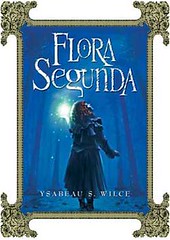Daffy futurism is always with us. It's been telling us that bookstores would be replaced by print-on-demand kiosks that could spit out a freshly produced and bound version of any book every published. Hasn't happened yet.
It's been predicting that books would be replaced by gadgets like the Sony e-book reader, allowing us to take hundreds of books in a package the size of a slender paperback. Hasn't happened yet. Although to be fair, E-ink is a legitimately intriguing technology, and will see useful application very soon.
But most of the discourse about technology and books circles around the idea of replacing books. I think the future is going to be more interesting than that. I think technology will enhance the book-as-artifact.
Genre literature is full of representations of books that transcend the static nature of dead ink on paper. In movies, both the Harry Potter movies and Minority Report featured newspapers with animated pictures. Much more interesting was Peter Greenaway's Prospero's Books, where Greenaway used animation, the then brand-new technology of HDTV, and other tricks to bring alive the fact that magic books were, well, magic, and could do things normal books never would -- drip tar, show the heavens in motion, unfurl graceful swinging pendulums, or provide a traveling home for insects.
Despite Clarke's Third Law, technology isn't going to give us books that cool anytime soon. But consider pop-up books. There is a long history of movable books, and some of them are pretty f'ing impressive. But, as they say, that's old tech. It's just paper. But take this pop-up book, that incorporates LED lights to create a working pop-up street lamp. Now that's cool.
And -- on the technology side at least -- things have the possibility to get much cooler. Given advances in projector miniaturization -- they're planning to put them in cellphones -- one could easily build a pop-up book that unfolded a screen, a small working projector, and enough flash memory to hold sub-vga versions of a dozen movies. You could even put in pop-up cars and make it a drive-in. Think of a gorgeous coffee table book about 30's horror movies that incorporated that as its central feature -- who wouldn't want that in their living room?
Of course it's not just pop-ups. Think of a fantasy novel with an integrated display and a motion sensor. As you physically panned the book across the room, it would show you a moving view of the world, as if you were looking through a tiny window shifting across a vast landscape. Or a book on robots that sprouted legs and walked towards you if you called it. An epistolatory novel where a new letter emerged from the next blank page each night.
Will any of this happen? Who knows. But it's all possible -- possible right now.
Let me offer a very loose metaphor for the future of books: the watch industry. When digital watches hit, they could tell time -- the functional purpose of a watch -- far better than any mechanical watch ever could. Yet people still pay stupendous sums for mechanical watches, because they believe in the craftsmanship involved, in the metaphor that intricate watches provide for man's mastery over time. They're not bought for function. They're bought because they are beautiful, and because they represent something.
Eventually, technology will supplant the purely functional nature of books. But maybe, just maybe, the essence of books -- what makes us love them -- the imagination and the discovery and the joy of touching smooth paper and sturdy binding -- will be refracted through technology to create something new.
Subscribe to:
Post Comments (Atom)











2 comments:
Dear Sieur Cake:
Have you hugged your patent attorney today? Seriously, what wonderful ideas! I'll remember I heard 'em here first. I hope some of these are put into practice SOON because I suspect they might inspire people who otherwise wouldn't dream of picking up a book to do so, and then maybe possibly hopefully even actually READ it. I'm horrified by how few people read fiction these days. Is it because recent generations seem to require more "visual aids" than the typical novel provides? I recently read Un Lun Dun with its leavening of groovy (albeit static) graphics and wondered if this is a hopeful wave of the future. Maybe books could have briefly-animated illustrations the reader could activate with a touch, kinda like those singing greeting cards. Or (if the author didn't want to impose on the reader's imagination with illustrations) maybe there could simply be beautiful abstract images at the beginning of each chapter, like those elaborate initials the monks used to do, and these could come alive in cool mesmerizing ways.
Welcome, Cake!
All this put me in mind of the "Young Lady's Illustrated Primer" from Neal Stephenson's Diamond Age, which is one of my favorite high-tech books.
The comparison with mechanical watches is a telling one. Like such timepieces, I think books as we know and think of them today, and perhaps reading itself, will become luxury items or pursuits, geared toward connoisseurs or plain oddballs.
I'm not convinced that books with various tech bells and whistles are yet anything more than curiosities, however, and will remain so until the tech addition delivers valuable functionality instead of some flashy but soon-to-be outmoded gimmick that will render the book itself outmoded regardless of its textual content.
Post a Comment